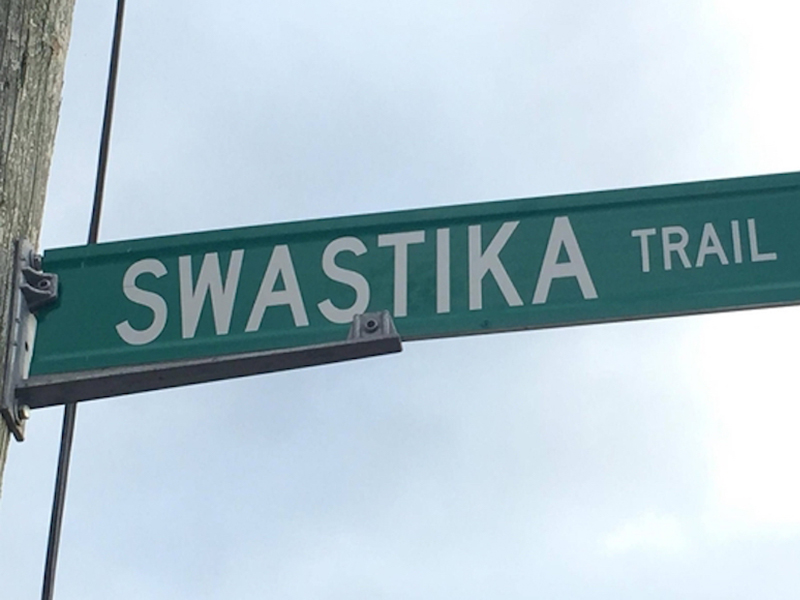On Dec. 20, 2017, the township council of Puslinch, Ont. voted 6-3 to maintain what some people viewed as a controversial street name, Swastika Trail. This decision frustrated some Canadians, including many in the Jewish community, who associated this street name with Adolf Hitler, Nazi Germany and the Holocaust.
Canadian Friends of Simon Wiesenthal Center president and CEO Avi Benlolo even went as far to write in a tweet that day, “Dear Mayor Lever of Puslinch Ont – Canada wants ‘Swastika Trail’ renamed. Its a national embarrassment given the evil the symbol and name represents.”
Benlolo has a pretty vivid imagination if he truly believed he was speaking on behalf of the entire nation. There were plenty of Canadians, including me, who felt Puslinch councillors did the right thing in preserving the street’s name.
Before the Nazis rose to power, the swastika was recognized as an important and sacred symbol in religions like Hinduism and Buddhism. As the United States Holocaust Museum acknowledges on its website, “the word swastika comes from the Sanskrit svastika, which means ‘good fortune’ or ‘well-being.’”
Swastika Trail acquired its name in the 1920s. Hitler didn’t become chancellor of Germany until Jan. 30, 1933. Hence, there’s no direct or indirect historical connection between this street name and the rise of Nazism.
Let’s assume the organizations that favoured the name change, like B’nai Brith Canada, were fully aware of the street’s origins. Why would they engage in a campaign to inaccurately link a racist period of history with a non-racist period of history?
It’s simple. They believe one bridge has supplanted the other. Since the swastika has evolved into a symbol of hate and intolerance, they don’t understand why any decent, tolerant group of individuals in Puslinch (or elsewhere) would want to live on, or be associated with, a street with this particular name.
Yet, this isn’t an isolated example. The word “Swastika” is also being used as a name in other communities. This includes Swastika, N.Y. (an unincorporated area), Wyoming’s Swastika Lake, Oregon’s Swastika Mountain and Swastika, Ont.
I’ve stepped foot in the latter community. It’s a small northern Ontario township in Kirkland Lake that was incorporated in 1908. Roughly 500 people currently live there. The residents were friendly and welcoming, and they despised – and still despise – any sort of comparison to Nazi Germany.
Nevertheless, they fiercely want to maintain their unique place in history.
When the Ontario government proposed the town’s name should be changed to “Winston” during World War II, in honour of then-British prime minister Sir Winston Churchill, Swastika’s residents pulled down the new sign and put up the old one. They weren’t going to be told what to do by provincial politicians, and which name they should use for their community.
Another notable sign was put up shortly thereafter. It read, “To hell with Hitler, we came up with our name first.”
This helps properly illustrate why the campaign against Swastika Trail was so distasteful in the first place.
The small rural street, much like the town of Swastika, has nothing to do with Hitler, Nazism, WWII, Aryan supremacy or anti-Semitism. It was therefore up to Puslinch town council, and the residents, to decide its fate and whether the true history would remain intact for generations to come.
As for Benlolo, B’nai Brith Canada and others, they learned two valuable lessons.
First, individuals and groups who attempt to rewrite history because aspects of history have changed aren’t deserving of widespread acclaim and/or support. Second, it really wasn’t any of their damn business to meddle in other people’s affairs – and they likely ended up turning off more people than they ultimately pleased.
Will Swastika Trail ever change its name? That remains to be seen. If another vote ever occurs in Puslinch Township, let’s hope most Canadians remember it’s not their community – and not their choice to make. n
* Michael Taube, a Troy Media syndicated columnist, Washington Times contributor and TV/radio pundit, was a speechwriter for former Prime Minister Stephen Harper.
